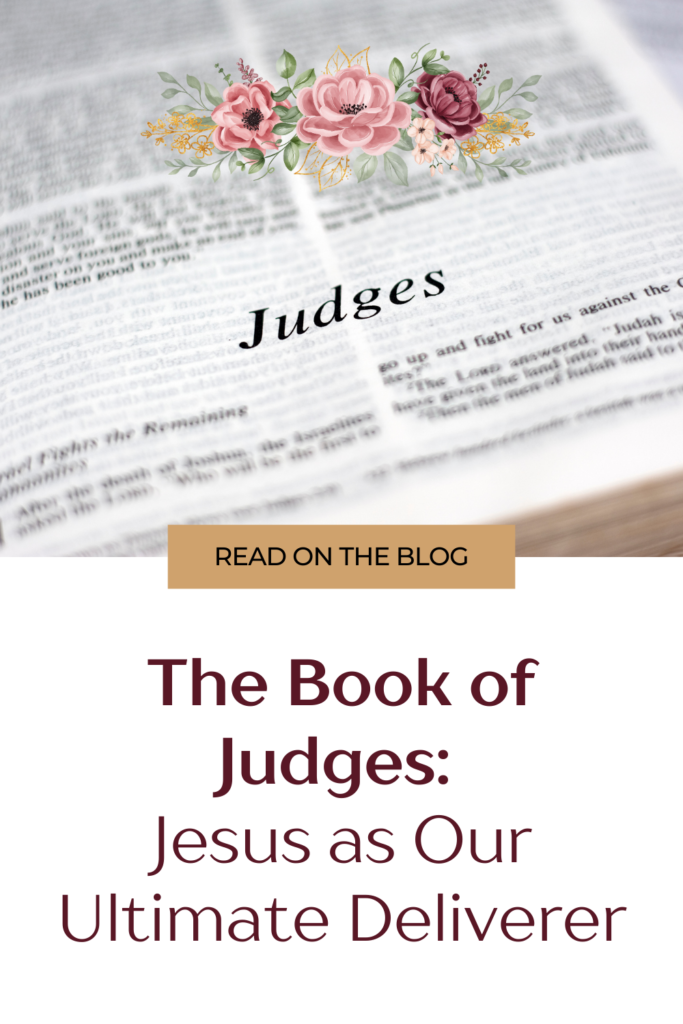The Book of Judges offers a powerful narrative of Israel’s struggles, triumphs, and repeated cycles of sin and redemption. It takes place after the death of Joshua, a time when Israel experiences both divine favor and judgment. The judges are raised up by God to deliver His people from oppression, but they are imperfect leaders who ultimately point to the need for a perfect Deliverer—Jesus Christ. In this post, we’ll explore the key themes and structure of Judges, its significance, and how we can see Jesus throughout its pages.
Background of Judges
The Book of Judges serves as a bridge between the conquest of Canaan (in Joshua) and the establishment of Israel’s monarchy (in 1 Samuel). Israel, after conquering the land, faces constant pressure from surrounding nations, and the people fall into cycles of sin, oppression, repentance, and deliverance. Judges, both military and spiritual leaders, arise to save Israel in times of crisis.
While the judges are temporary deliverers, they are flawed, and their stories ultimately highlight the need for a true and eternal Savior—Jesus Christ. The name “judge” in this context refers not only to legal authority but also to military and spiritual leadership.
The Cycle of Sin and Deliverance (Judges 1–16)
One of the primary themes in Judges is the cyclical nature of Israel’s sin and redemption. The people repeatedly fall into sin, face oppression, cry out to God, and are then delivered by a judge. This cycle happens over and over, showing the recurring nature of Israel’s spiritual failures and the need for ultimate redemption.
Israel’s Apostasy (Judges 1–2)
After the death of Joshua, Israel fails to fully drive out the Canaanites, and the people begin to worship foreign gods, which leads them into sin and idolatry. God allows them to experience oppression from surrounding nations as a consequence of their disobedience. This sets the stage for the need for deliverance.
The Judges and Their Deliverance (Judges 3–16)
God raises up judges to deliver the Israelites from their enemies. These judges are often flawed individuals, but God uses them to bring victory and peace. Some notable judges include:
- Othniel (Judges 3:7-11): He delivers Israel from the king of Aram.
- Ehud (Judges 3:12-30): He delivers Israel from the Moabites, notably using a left-handed tactic to assassinate the Moabite king.
- Deborah (Judges 4–5): A prophetess who leads Israel to victory over the Canaanites.
- Gideon (Judges 6–8): He defeats the Midianites with just 300 men, showing that victory comes from God, not human strength.
- Samson (Judges 13–16): Known for his strength, he defeats the Philistines, though his personal failings reveal the dangers of pride and disobedience.
The Need for a King (Judges 17–21)
The last chapters of Judges show a period of moral and spiritual decline. The tribes of Israel fail to unite, and the consequences of their sin are deeply felt. The repeated refrain of these chapters is, “In those days there was no king in Israel; everyone did what was right in his own eyes” (Judges 21:25). This highlights Israel’s desperate need for a righteous leader.
Micah’s Idolatry (Judges 17–18)
In these chapters, we see the story of Micah, who sets up idols in his home, leading to further idolatry and corruption within Israel. This mirrors the spiritual decay that would ultimately lead to Israel’s desire for a king to lead them in righteousness.
The Levite’s Concubine (Judges 19–21)
The book ends with a horrific account of violence and moral decay, culminating in civil war between the tribes of Israel. This tragic story underscores the chaos and depravity that occurs when people refuse to follow God’s law.

Where You Can See Jesus in Judges
In the Judges: Each judge, while a temporary deliverer, points forward to the ultimate Deliverer—Jesus. Like the judges, Jesus came to save us from the oppression of sin. However, unlike the judges, Jesus is perfect and eternal, offering salvation not just for a time, but for eternity (Matthew 1:21).
In Gideon: Gideon’s story is a powerful picture of God’s grace and power. Gideon, initially a fearful and reluctant leader, becomes a mighty warrior through God’s intervention. Jesus also offers victory, not through human strength, but through God’s power working in and through us (2 Corinthians 12:9-10).
In Samson: While Samson’s strength was a gift from God, his story is also a reminder of the dangers of pride and sin. Samson’s final act of strength, sacrificing himself to defeat the Philistines, points to the ultimate sacrifice Jesus made on the cross to defeat sin and death (John 12:31-33).
In the Cycle of Sin and Redemption: The repeated cycle of sin, oppression, repentance, and deliverance in Judges points to the need for a final, ultimate Deliverer—Jesus. He breaks the cycle of sin once and for all through His sacrifice on the cross (Romans 7:24-25, Galatians 1:4).
Key Themes in Judges
- God’s Faithfulness Despite Human Failure: Even though Israel repeatedly falls into sin, God remains faithful to His promises and raises up deliverers to save His people. Similarly, Jesus remains faithful to us, offering forgiveness and salvation despite our failures (2 Timothy 2:13).
- Victory through God’s Power: The judges are successful because God empowers them. This highlights the truth that victory in our own lives comes not through our strength, but through God’s power working in us (Philippians 4:13, Zechariah 4:6).
- The Need for a Righteous King: The book of Judges ends with the recognition that Israel needs a righteous leader. Jesus is that leader, the King of Kings, who brings ultimate justice and peace (Revelation 19:16).
How We Can Apply Judges to Our Lives Today
- Trust in God’s Deliverance: Just as the Israelites needed deliverance from their enemies, we need deliverance from the power of sin. Jesus is our ultimate Deliverer, and we can trust in Him for freedom and victory (Romans 6:18).
- Repent and Turn Back to God: The cyclical nature of sin in Judges shows us the importance of repentance. When we stray, we can return to God, who is always ready to forgive and restore us (1 John 1:9, Acts 3:19).
- Depend on God’s Power: Just as the judges depended on God’s strength, we must rely on God’s power, not our own, to face the challenges in our lives (2 Corinthians 12:9-10).
- Look for Jesus, Our Perfect Leader: Judges reminds us of our need for a perfect leader. Jesus is that leader, and He calls us to follow Him, trusting in His leadership and wisdom (John 14:6, Hebrews 12:2).
Conclusion
The Book of Judges is a sobering reminder of the consequences of sin and the need for a righteous leader. While the judges were imperfect deliverers, they point us to Jesus, the perfect Deliverer, who saves us from sin and leads us into victory. As we face challenges in our own lives, we can look to Jesus for the ultimate deliverance, strength, and leadership that we need.
Call to Action
What areas of your life do you need to experience deliverance? How can you trust Jesus as your ultimate Deliverer today? Share your thoughts and reflections in the comments below, and let’s encourage each other to turn to Jesus for freedom and victory. If you found this post helpful, consider sharing it with others who may need to hear about God’s faithfulness and deliverance.






